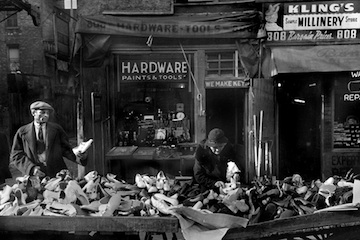What Was the Maxwell Street Market?
A market has meant many different things at different times throughout the history of the United States. From today's sprawling metroplexes to frontier general stores, from company stores in railroad towns to the online transactions of the internet age. One of the fixtures of many immigrant neighborhoods in the late 1800s and beyond was the open air street market, exemplified famously by the Maxwell Street market in Chicago.
Centered on Maxwell Street on Chicago's near west side, the market was a centerpiece of the city's Jewish immigrant community. Wares of any type, generally used, were set out and haggled for in the tradition of the old country. Outsiders were welcome to venture in, and, a sign promised, they would "cheat you fair". The neighborhood itself was historically a place for new arrivals to Chicago and was quite crowded. Multiple families packed themselves into small homes and tenements, all while striving to survive and thrive in America.
Some became quite wealthy over time in this milieu, using it as their entry into America's established classes. They were quickly replaced by new arrivals. As the Great Migration picked up in the 1910s and 20s, thousands of blacks from Mississippi and other such places arrived and brought their own labor and musical traditions. Open air musicians and preachers proliferated, and later as the electric guitar was born, techniques were perfected in this area. Merchants were usually happy to have musicians around for the crowds they attracted.
The power of the city planners to make or break the layout of the city would eventually make itself known. The Dan Ryan expressway cut a hole through the market and pushed it westward. Urban renewal plans were created with the aim of ending the market entirely and subsuming its real estate into the nearby University of Illinois at Chicago. Battles over this plan dragged on through the 1960s, 70s, and even later into the century. The market itself was finally closed in 1994 and many of the historic buildings in the area were bulldozed and rebuilt. The Maxwell Street Foundation is an organization that was founded to oppose these developments, and to more generally foster an appreciation for the history of the market and the neighborhood.
